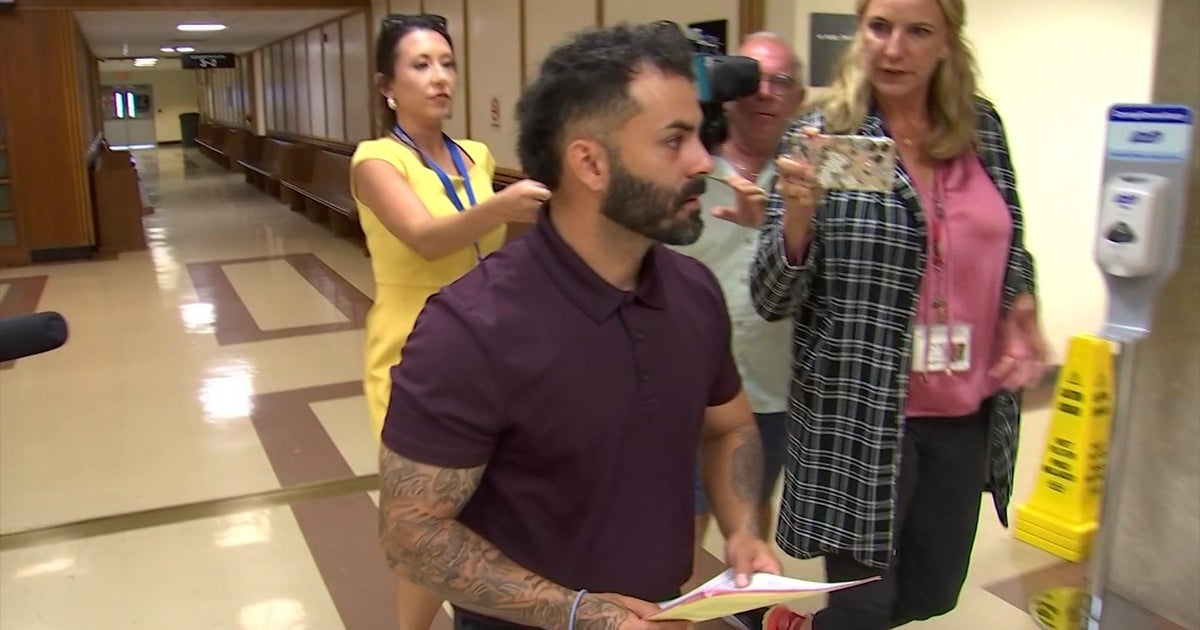Royal Caribbean Cancels 8 Cruises Out Of China Over Coronavirus Fears
MIAMI (CBSMiami/CNN) – Royal Caribbean announced it has canceled eight cruises out of China through March 4th because of the coronavirus.
The cruise liner added it is denying boarding to any individual who has traveled to or from mainland China or Hong Kong within the past 15 days.
If you plan on crisscrossing the globe, here's what you should know about the virus outbreak:
US Escalates Precautions To Stem Spread Of Virus
New travel restrictions aimed at stemming the spread of the virus went into effect Sunday evening in the United States.
Any US citizen who has been in China's Hubei Province in the last 14 days is subject to up to 14 days of mandatory quarantine upon return to the United States, said US Health and Human Services Secretary Alex Azar.
US citizens who have been to the rest of mainland China in the last 14 days must undergo screening at one of 11 designated US airports.
If passengers are screened and show no symptoms they will be re-booked to their final destination and asked to "self-quarantine" for up to two weeks inside their home, DHS says.
The new rules also mean foreign nationals who were recently in China will be temporarily denied entry into the US, Azar said.
Advisories Discourage Travel To China
The US State Department has escalated its China travel warning to the highest level. The State Department advisory is at "Level 4: Do not travel."
The US Centers for Disease Control and Prevention's travel advisory is also at the highest level, urging travelers to avoid all nonessential travel to the country.
The United Kingdom and Canada are among other nations that have issued travel warnings for China.
The World Health Organization declared the novel coronavirus outbreak a public health emergency of international concern, after an emergency committee reconvened on January 30 in Geneva.
A number of foreign governments, including the United States, the United Kingdom, France and South Korea have evacuated citizens from Wuhan.
Airlines Are Suspending Flights To China
Airlines all over the globe are canceling flights to China.
Delta Air Lines suspended flights between the United States and China on Sunday, four days earlier than initially planned. The suspension will last until at least April 30, according to a press release.
American Airlines also suspended flights between the US and China, effective January 31 through March 28. American has also canceled some flights to Hong Kong.
United Airlines is suspending flights from the US to Beijing, Chengdu and Shanghai beginning February 6.
Other airlines, including British Airways, Lufthansa, Air France, Air Asia, EgyptAir, Cathay Pacific, Air India and Finnair have similarly slashed or suspended service.
Many airlines have offered waivers on change fees or the option to cancel for credit on a future flight.
Travelers with upcoming plans should check with their airlines and look for advisories posted on carriers' websites.
In additional to Royal Caribbean, the following cruise lines have canceled scheduled sailings to China: Azamara, Celebrity and Silversea.
Many cruise lines have also modified schedules to skip some ports of call and boosted screening procedures for passengers, including denial of boarding in some cases to those who have visited China recently, according to CruiseCritic.com.
Most Travel Insurance Is Unlikely To Cover This Situation
Airlines are relaxing their policies and some major hotel chains are waiving cancellation fees, but recouping all the costs associated with trips canceled due to Wuhan coronavirus fears is far from guaranteed.
An outbreak of a virus is not covered under most standard trip cancellation insurance policies, according to TravelInsurance.com.
"For those who purchased a Cancel for Any Reason (CFAR) optional upgrade, however, some measure of trip cancellation protection may be available," according to Stan Sandberg, co-founder of TravelInsurance.com.
"For those holding an existing travel insurance policy, they should contact their travel insurance providers to find out if their plans have any coverage," Sandberg advises.
Advice For Travelers Who Cannot Avoid Travel To China
Travelers who cannot delay traveling to China should practice enhanced precautions by avoiding contact with sick people, animals and animal markets and frequently and thoroughly washing hands, the CDC recommends.
The CDC advises washing hands often with soap and water for at least 20 seconds. An alcohol-based hand sanitizer can be used when soap and water are not available.
Discuss travel to China with your healthcare providers, the CDC advises, noting that older adults and travelers with underlying health issues may be at higher risk.
Travelers who've visited China within the past two weeks and are feeling sick with fever, have a cough or difficulty breathing should seek treatment right away and call ahead to tell medical providers about recent travel to China and symptoms.
The CDC also advises potentially infected travelers to avoid contact with others, to not travel while sick and to be sure to cover your mouth and nose with a tissue or your sleeve (not your hands) when coughing or sneezing.
Universal Precautions To Avoid Illness Apply To All Travelers
Some of the above precautions apply to all travelers, particularly during winter respiratory illness season.
Influenza is a bigger threat to global public health than coronavirus right now, says Dr. William Schaffner, a professor of medicine in Vanderbilt University's division of infectious diseases.
By the time flu season is over, influenza "will have caused literally thousands of hospitalizations and unfortunately several thousand deaths."
"The coronavirus will be a blip on the horizon in comparison, but we have a little outbreak of corona anxiety at the present time because it's new, it's mysterious..."
In the United States alone, the CDC estimates more than 8,000 deaths so far this flu season.
Wuhan coronavirus is not a big concern for US travelers traveling domestically, Schaffner says.
In this era of global travel, you can never say the risk is zero of being exposed to something, says Dr. Yoko Furuya, associate professor of medicine in the division of infectious diseases at Columbia University Irving Medical Center.
But most of the cases so far have involved Wuhan and surrounding cities in Hubei Province.
"While the risk is not going to be zero, generally speaking there's not going to be a particularly elevated risk" outside that area, she says.
Hand Washing Is A Strong Defense; Masks Are Less Effective
Schaffner has received a lot of questions about whether people should be wearing masks to avoid infection.
He realizes it's culturally very common in Asia, but he says the CDC doesn't recommend it for the general public because "the scientific basis showing that people in the community wearing masks actually has any benefit is very thin and questionable."
More fitted respirator masks may be used in medical settings, but are generally impractical for the general public, Schaffner says.
"Good hand hygiene is always a really good idea to protect yourself from any viruses and other pathogens in your environment," says Furuya.
Air Travel Is Part Of How Viruses Spread
For parts of the world outside of the heavily affected region, air travel is likely where more of the risk will lie, says Furuya, because of the increased likelihood of encountering international travelers from areas with high incidence of the virus.
"When it comes to the global spread of outbreaks, air travel is usually how things kind of spread quickly from country to country," she says.
Schaffner says the spread of winter respiratory illnesses on airplanes is always a concern. "More than once, I'm quite certain personally that I have acquired a winter virus on the aircraft while traveling or working my way through crowded airports," he says.
Frequent and vigorous hand washing is again critical to reducing viral transmissions.
(©2020 CBS Broadcasting Inc. All Rights Reserved. Cable News Network, Inc., a Time Warner Company, contributed to this report.)



